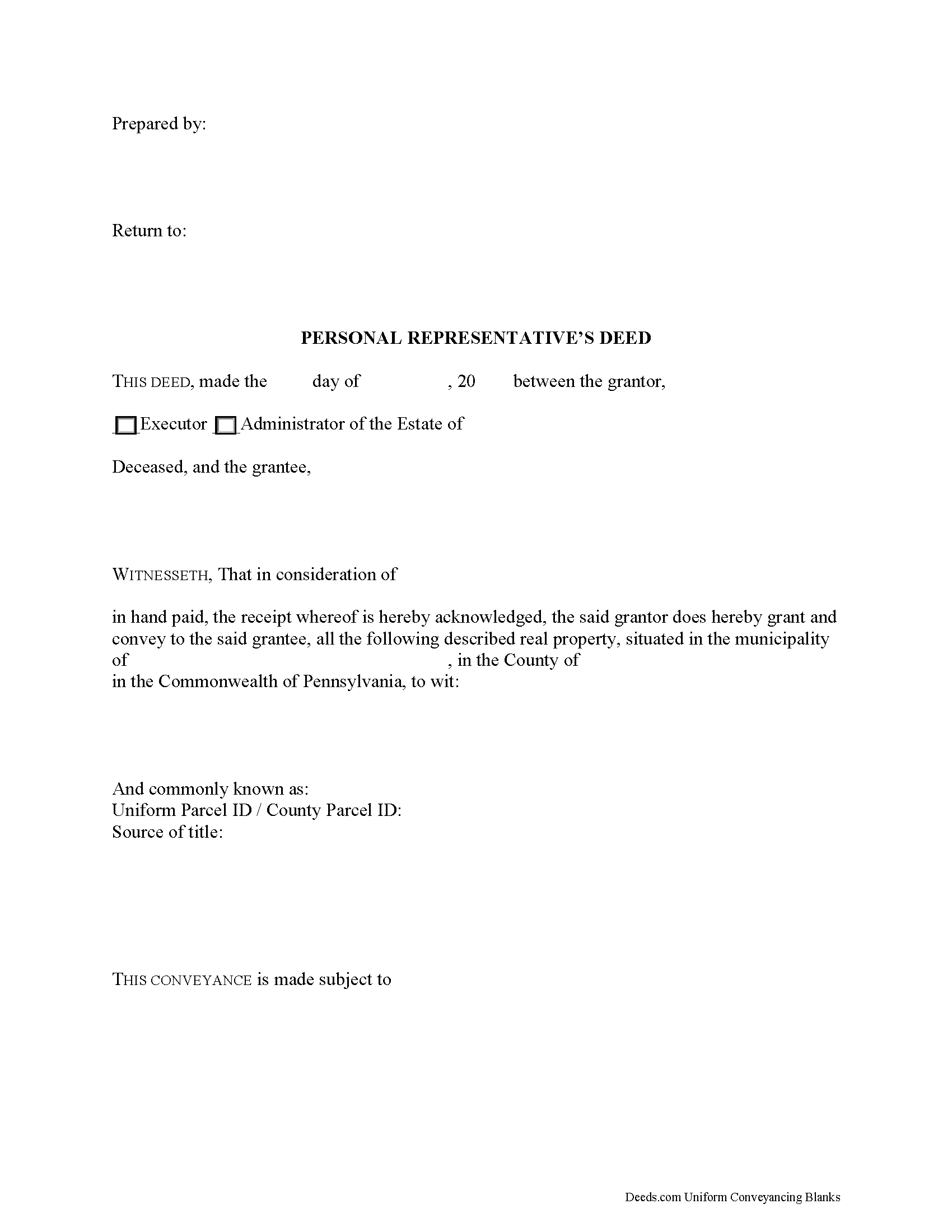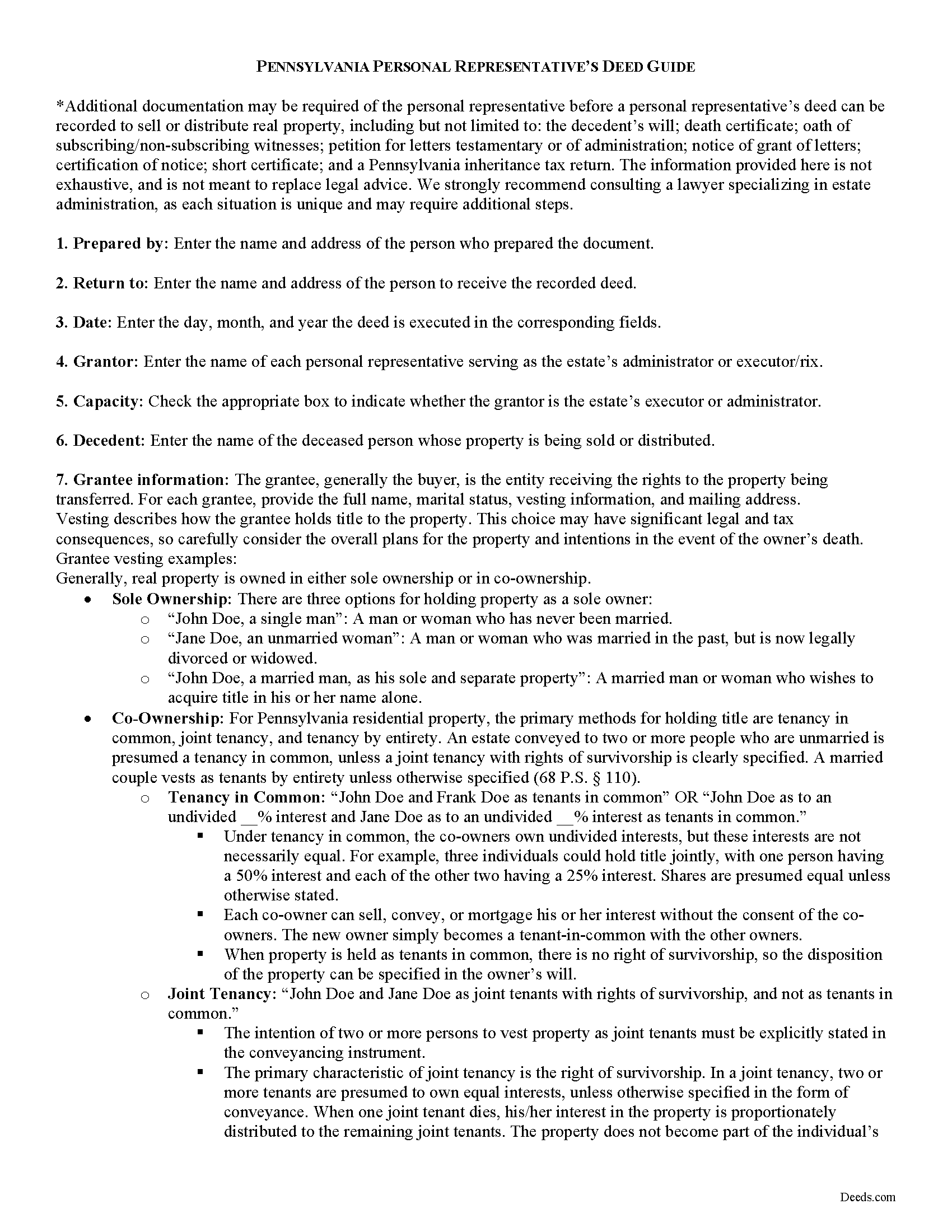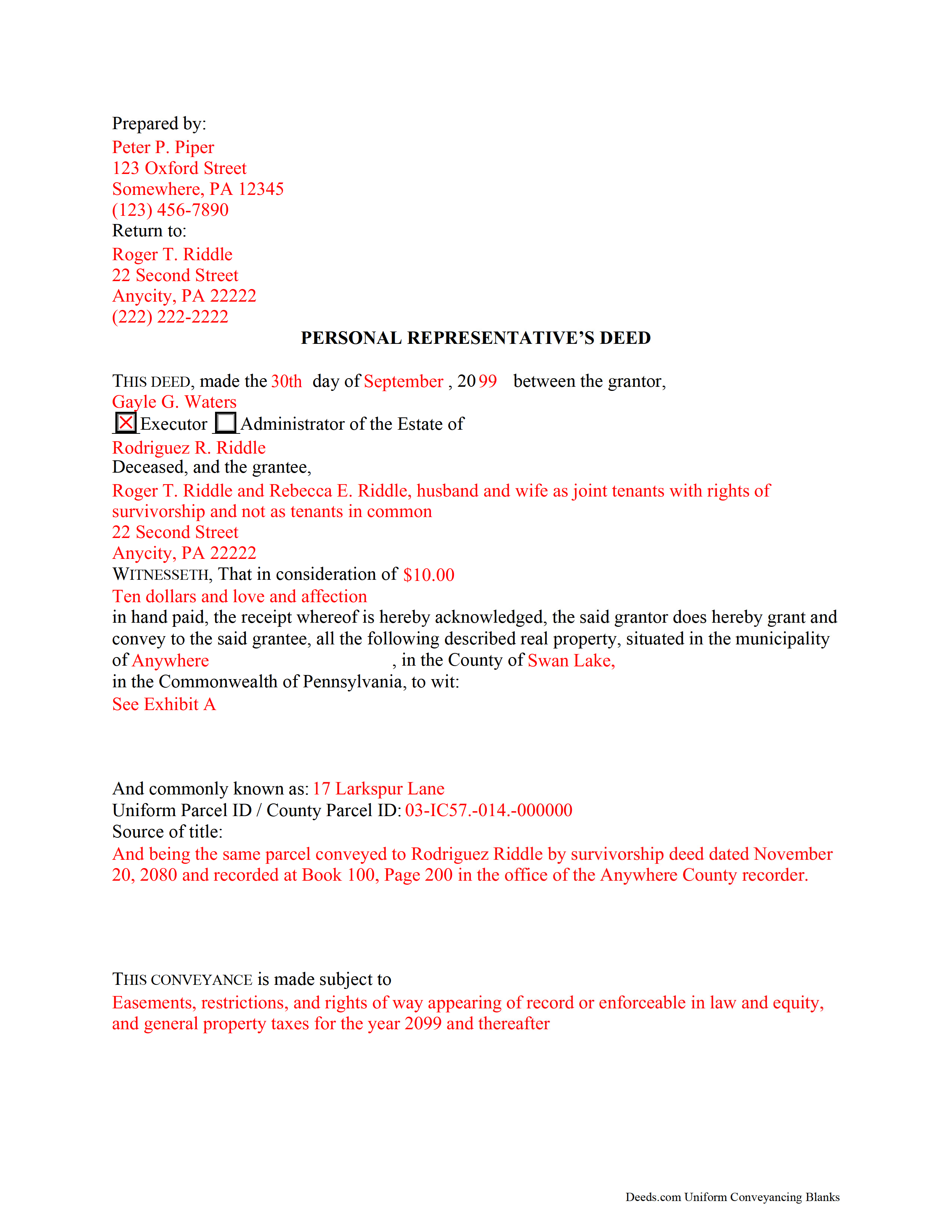Venango County Personal Representative Deed Form (Pennsylvania)
All Venango County specific forms and documents listed below are included in your immediate download package:
Personal Representative Deed Form

Fill in the blank form formatted to comply with all recording and content requirements.
Included Venango County compliant document last validated/updated 3/5/2025
Personal Representative Deed Guide

Line by line guide explaining every blank on the form.
Included Venango County compliant document last validated/updated 5/26/2025
Completed Example of the Personal Representative Deed Document

Example of a properly completed form for reference.
Included Venango County compliant document last validated/updated 5/29/2025
The following Pennsylvania and Venango County supplemental forms are included as a courtesy with your order:
When using these Personal Representative Deed forms, the subject real estate must be physically located in Venango County. The executed documents should then be recorded in the following office:
Register & Recorder - County Courthouse
1168 Liberty St, 1st Floor, Franklin, Pennsylvania 16323
Hours: 8:30 to 4:30 Monday through Friday
Phone: (814) 432-9539
Local jurisdictions located in Venango County include:
- Clintonville
- Cooperstown
- Cranberry
- Emlenton
- Franklin
- Kennerdell
- Oil City
- Pleasantville
- Polk
- Reno
- Rouseville
- Seneca
- Utica
- Venus
How long does it take to get my forms?
Forms are available immediately after submitting payment.
How do I get my forms, are they emailed?
Immediately after you submit payment, the Venango County forms you order will be available for download directly from your account. You can then download the forms to your computer. If you do not already have an account, one will be created for you as part of the order process, and your login details will be provided to you. If you encounter any issues accessing your forms, please reach out to our support team for assistance. Forms are NOT emailed to you.
What does "validated/updated" mean?
This indicates the most recent date when at least one of the following occurred:
- Updated: The document was updated or changed to remain compliant.
- Validated: The document was examined by an attorney or staff, or it was successfully recorded in Venango County using our eRecording service.
Are these forms guaranteed to be recordable in Venango County?
Yes. Our form blanks are guaranteed to meet or exceed all formatting requirements set forth by Venango County including margin requirements, content requirements, font and font size requirements.
Can the Personal Representative Deed forms be re-used?
Yes. You can re-use the forms for your personal use. For example, if you have more than one property in Venango County that you need to transfer you would only need to order our forms once for all of your properties in Venango County.
What are supplemental forms?
Often when a deed is recorded, additional documents are required by Pennsylvania or Venango County. These could be tax related, informational, or even as simple as a coversheet. Supplemental forms are provided for free with your order where available.
What type of files are the forms?
All of our Venango County Personal Representative Deed forms are PDFs. You will need to have or get Adobe Reader to use our forms. Adobe Reader is free software that most computers already have installed.
Do I need any special software to use these forms?
You will need to have Adobe Reader installed on your computer to use our forms. Adobe Reader is free software that most computers already have installed.
Do I have to enter all of my property information online?
No. The blank forms are downloaded to your computer and you fill them out there, at your convenience.
Can I save the completed form, email it to someone?
Yes, you can save your deed form at any point with your information in it. The forms can also be emailed, blank or complete, as attachments.
Are there any recurring fees involved?
No. Nothing to cancel, no memberships, no recurring fees.
Using a Personal Representative's Deed in Pennsylvania
--
The information provided in this article is not meant to be exhaustive, and should not take the place of legal advice. We strongly recommend consulting a lawyer when administering an estate, as each situation is unique. Personal representatives have a fiduciary duty to serve in the estate's best interests, and are "personally liable for undue mistakes made in the administration of the decedent's estate" [1].
--
When Pennsylvania residents die, their estate is admitted to probate, regardless of whether they left a will. A will is a legal document whereby a person (testator) gives directions for the distribution of personal assets upon death, and identifies who will administer the estate. Probate is the legal process of distributing assets. In the Commonwealth of Pennsylvania, this process, also referred to as estate administration, is governed by Title 20 et seq. of the Pennsylvania Code (Decedents, Estates, and Fiduciaries).
A probate case begins with the Register of Wills for the county where the deceased claimed permanent residence. Those with property situated in two or more counties also require ancillary probate proceedings. The decedent's will, if one exists, is recorded at this time, along with supporting documents (ex. death certificate, affidavit of subscribing or non-subscribing witness, petition for grant of letters). Pennsylvania implements an expedited probate for estates valued under $50,000.
Upon petition for grant of letters, the Register of Wills issues letters of administration or letters testamentary, depending on whether the decedent died testate (with a will) or intestate (without a will). The letters are a document granting formal authority to the fiduciary who will administer the estate, and are filed as part of the probate case. Fiduciaries may also obtain a short certificate from the Register certifying their capacity to administer the decedent's estate.
This fiduciary is known generally as a "personal representative," or more specifically as either an executor (or executrix, if female) or an administrator. The term "executor" is used when the decedent died with a will and named an executor. The term "administrator" is used when (1) the decedent died without a will (2) the decedent died testate but failed to name an executor in the will, or (3) the decedent died with a will and named an executor, but the executor failed or ceased service. In short, an executor is someone designated by will as the personal representative, whereas an administrator is someone appointed by the Register.
All assets owned solely by the decedent must go through probate. Concerning real property, when the decedent vests title as a sole owner or as a tenant in common, the real property will need to go through probate before it can be distributed by the personal representative. Real property vested with rights of survivorship between or among joint tenants or between husband and wife as tenants by the entirety automatically vests in the surviving joint tenant(s) or spouse. Property held in trust may also avoid probate.
The personal representative has several responsibilities as fiduciary, including submitting a comprehensive inventory of the estate, filing a Pennsylvania Inheritance Tax Return, giving notice to beneficiaries, and paying any debts, before any distribution of assets can occur. Depending on the situation, this process may take several months, so seek legal advice to ensure that all requisite steps are met.
When the decedent leaves instructions for the succession of real property, the named beneficiaries in the will are called devisees. When there is no will, Pennsylvania laws of intestacy determine the succession of the decedent's real property, with title flowing to the decedent's heirs at law. Depending on the situation, the personal representative may sell the decedent's real property [2].
In Pennsylvania, both executors and administrators use the personal representative's deed to distribute or sell real property. As with other types of deeds executed by grantors in a representative capacity (such as trustee's deeds), the personal representative's deed in Pennsylvania typically carries a special warranty, covenanting that the grantor will warrant and defend the property against the lawful claims and demands of the grantor or grantors, and all persons claiming or to claim by, through, or under him or them (21 P.S. 6). The special warranty is fitting for grantors who are transferring property indirectly, or on behalf of, an estate, as they may not have comprehensive knowledge of the title's history prior to the decedent's death.
The deed identifies the acting personal representative as either an executor or administrator, as well as the decedent and date of death. In addition to the grantee and vesting information, legal description of the subject property, and title derivation required for documents pertaining to interests in real property, the personal representative's deed cites the date of the testator's will, if any; the date of probate; the county of probate; the file or case number; and the name of the personal representative.
The deed is signed by the acting representative in the presence of a notary public and recorded in the county Register of Deeds in which the subject real property is situated. Additional notices may be required in Pennsylvania concerning coal and mine subsidence, and supporting documents such as a death certificate and a short certificate may be required to verify the personal representative's authority to convey real property.
To formally close probate, the personal representative must file a report of completion with the register of wills.
If administration of estate not complete within two years of the decedent's date of death, the personal representative may have to file a status report with Register of Wills.
See more forms relating to estate administration at http://www.revenue.pa.gov/FormsandPublications/FormsforIndividuals/Pages/Inheritance-Tax.aspx#.WFABK-YrLIU.
Contact a lawyer with questions regarding estate administration and probate in Pennsylvania.
[1] http://www.whiteandwilliams.com/resources-alerts-Personal-Representatives-and-Fiduciaries-Executors-Administrators-and-Trustees-and-Their-Duties.html
[2] http://www.stallardlawoffice.com/single-post/2015/09/19/Posts-on-Pennsylvania-Real-Property-Title-Death-Wills-and-Joint-Ownership
(Pennsylvania PRD Package includes form, guidelines, and completed example)
Our Promise
The documents you receive here will meet, or exceed, the Venango County recording requirements for formatting. If there's an issue caused by our formatting, we'll make it right and refund your payment.
Save Time and Money
Get your Venango County Personal Representative Deed form done right the first time with Deeds.com Uniform Conveyancing Blanks. At Deeds.com, we understand that your time and money are valuable resources, and we don't want you to face a penalty fee or rejection imposed by a county recorder for submitting nonstandard documents. We constantly review and update our forms to meet rapidly changing state and county recording requirements for roughly 3,500 counties and local jurisdictions.
4.8 out of 5 - ( 4562 Reviews )
MARY LACEY M.
June 30th, 2025
Great service! Recording was smooth and swiftly performed. Deeds.com is an excellent service.rn
We are delighted to have been of service. Thank you for the positive review!
Robert F.
June 30th, 2025
Breeze.... It feels silly to hire an attorney to do this for just one beneficiary. Thanks.
Thank you for your feedback. We really appreciate it. Have a great day!
Pauline C.
June 29th, 2025
Everything that was stated to be included in my order was complete. Very satisfied
Thank you for your positive words! We’re thrilled to hear about your experience.
Lynn B.
June 15th, 2022
Their customer service is impressive to say the least. I sent them an email and I received a response that the issue had been resolved in under an hour. They even apologized for the inconvenience. I haven't used the forms I purchased yet but if they are anything like their Customer service, I know I will be extremely satisfied with my purchase. I will definitely return here for ALL my needs they can provide for in the future.
Thank you for your feedback. We really appreciate it. Have a great day!
Evtishios D.
March 17th, 2019
good site only recommendation would to allow to down load multiple forms at one time
Thank you for your feedback Evtishios.
Lisa B.
April 13th, 2019
Awesome service. User friendly, simple, easy and quick to fill out with instructions and sample copy and print.
Thank you Lisa, we appreciate your feedback.
Maricela N.
May 5th, 2021
very easy and quick to get all the forms needed! Thank you!
Thank you for your feedback. We really appreciate it. Have a great day!
Ginger L.
May 29th, 2022
Excellent full set of documents with example and guidelines on how to do it ourselves without paying a lawyer. Or, we save legal fees by completing it ourselves and having a lawyer review it. Love that I can save the pdf and fill it out whenever I want. Thank you for having this available!
We appreciate your business and value your feedback. Thank you. Have a wonderful day!
Deborah H.
July 13th, 2020
Wonderful service, very fast and great customer service will be using you guys from now on. Thanks a bunch
Thank you for your feedback. We really appreciate it. Have a great day!
Christopher G.
August 12th, 2019
couldn't find what I was looking for.
Thank you for your feedback Christopher, sorry to hear that you couldn't find what you were looking for. Have a wonderful day.
Dubelsa T.
July 13th, 2020
Loved it!!!!! Beats going downtown!!!! Super easy and fast!!!
We appreciate your business and value your feedback. Thank you. Have a wonderful day!
Jerry W.
March 16th, 2020
Great program and easy to follow instructions.
Thank you for your feedback. We really appreciate it. Have a great day!
Steve B.
February 6th, 2020
Good format. Timely response. Adding a photo of the property would be a good improvement.
Thank you for your feedback. We really appreciate it. Have a great day!
Daniel B.
December 24th, 2024
easy to use and upload.
We are delighted to have been of service. Thank you for the positive review!
Roger A.
November 2nd, 2023
Easy peasy to use! It's great to have the guide for completing the form and an example of a completed form.
It was a pleasure serving you. Thank you for the positive feedback!